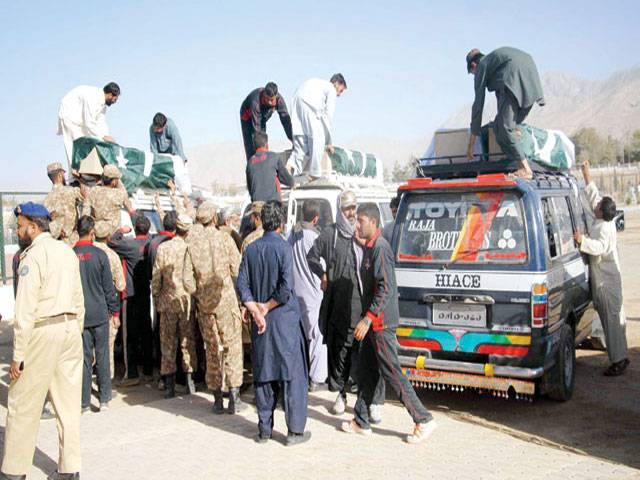QUETTA - The country on Tuesday mourned the killing of at least 63 jawans in a gun and suicide bomb attack on a police academy in Quetta, the deadliest attack on a security installation in the country’s history.
The provincial metropolis was in the grip of gloom after 63 security people – 61 police recruits and two soldiers – were killed and over 150 injured in a dastardly attack on the hostels of Police Training College located on Saryab Road, 10 kilometres from the heart of the capital city. This main city road had been in the past scene of major terrorist attacks killing scores of innocent people.
Since Monday night Quetta was placed under high security alert with police, FC and army contingents engaged in carrying out operation to clear the hostels from the attackers and patrolling the city’s major roads to nab fleeing terrorists. Ambulances remained shuttling between the scene of the tragedy and hospitals located in different parts of the city.
Emergency was still effective in all the hospitals where around 150 injured were undergoing various stages of treatment. Units of FC and army had been deployed in and outside of all the four major hospitals. A large number of injured, some of them critically, were housed in Civil Hospital. Leaves and weekly offdays of medical and paramedical staff have been cancelled.
Long queues of relatives of the injured, including those who had volunteered to donate blood for injured police cadets, were seen. Balochistan Health Minister Saleh Muhammad Baloch informed the media that there was no shortage of blood. He himself donated a pint of blood at the Civil Hospital blood bank.
The Namaz-e-Janaza of martyred cadets and security officials, offered yesterday afternoon, was also attended by the prime minister and the army chief along with their comrades and civilian officials.
The hostels and the police training centre were still closed to general public despite having been declared cleared. The most tragic fact is that this centre has witnessed terrorist attacks twice in the past. The inspector general of police, according to a media report, had proposed to the provincial government to replace the mudwall around the centre with a brick wall, but no heed was paid to it for unknown reasons.
It may be worth mentioning that Justice Faiz Isa of the Supreme Court was in Quetta yesterday as head of the inquiry commission probing the Civil Hospital tragedy that had killed the entire cream of lawyers. The residents of Quetta had hardly forgotten the tragedy of Civil Hospital blast that the bloody police training centre attack added to their miseries.
Vehicles remained plying on the city roads since the authorities did not close educational institutions and government offices. Shopping centres remained thronged by shoppers painting a picture as if all was well. When asked, a resident returning with hanging shopping bags quipped: “We are now immune to such attacks and blasts. Nobody is doing anything to stop this madness. Top civil and military leaders come and create hue and cry, but the result is zero. This inhuman activity apparently has no end.”
The heroic action of Capt Roohullah Shaheed was on the lips of all those who came to know of what actually happened inside the hostel. One injured soldier in the Civil Hospital said: “Salute to Capt Roohullah who came to rescue the police training centre. He was a brave officer and was leading his unit to rescue those taken hostage by the attackers. As he fired at an attacker in the head, he blew himself up that hit the captain.”
AFP adds: The attack on the Balochistan police college, around 20 kilometres east of the provincial capital, began around 10pm on Monday, with gunfire continuing to ring out at the site for several hours.
Major-General Sher Afgan, chief of the paramilitary Frontier Corps in Balochistan which led the counter-operation, blamed the attack on Pakistani Taliban-affiliated Lashkar-e-Jhangvi (LeJ) militant group and said the counter-strike was over in three hours. An emailed claim from the Pakistani Taliban who share close operational ties with LeJ backed that assertion.
“This attack was carried out on the instructions of Mullah Daud Mansour, a close ally of Hakimullah Mehsud and head of Pakistani Taliban in Karachi,” it said, adding four fighters took part in the terror incident.
It said the attack was revenge for the deaths of its fighters “outside jails” in Punjab, in an apparent reference to the recent surge in extrajudicial killings of LeJ fighters.
The Islamic State group also made a claim via Amaq, its affiliated news agency, and released a picture of what it said were the three attackers.






